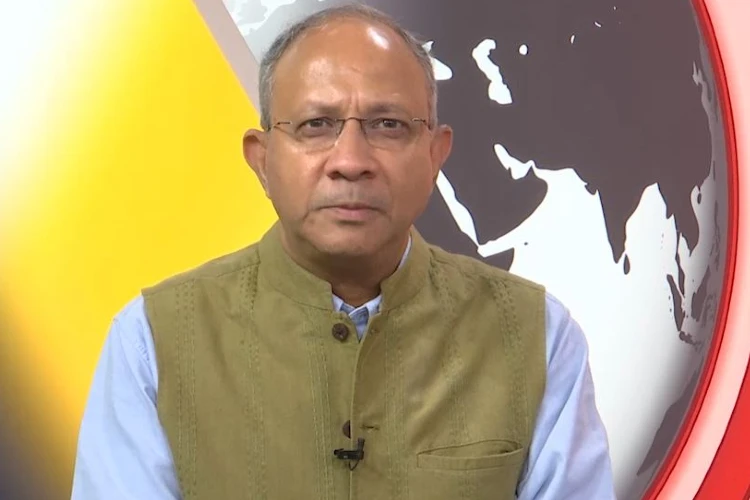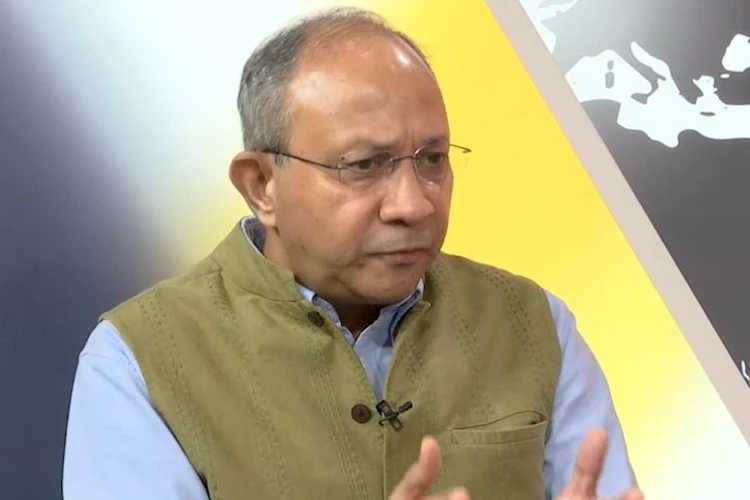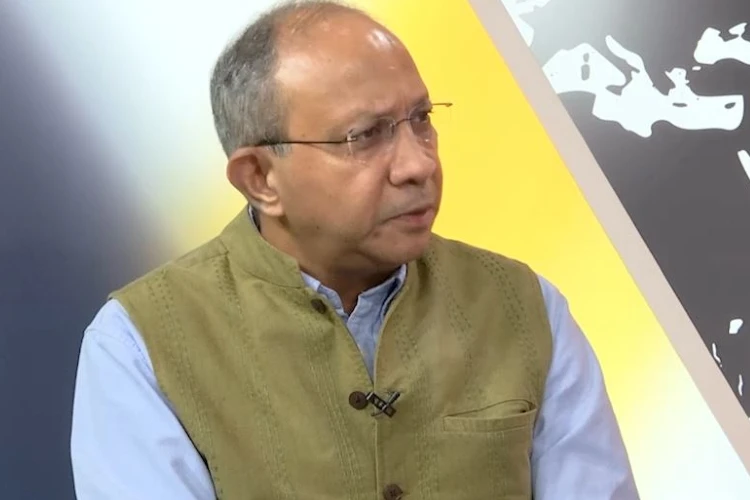
Tripti Nath/New Delhi
Former Deputy National Security Advisor Pankaj Saran says that Pakistan’s very skewed focus on Kashmir seems to be blinding it to the real challenges.
“Playing the card of terrorism or raising the Kashmir issue has not done too much benefit to Pakistan. The elites in Pakistan must introspect the challenges it faces. It is not Kashmir,’’ observed Ambassador Saran while hosting the show ‘Around the world with Pankaj Saran’ for Awaz-the Voice.
He said that structural fault-lines in Pakistan between the Army and the intelligence agencies on the one hand and the political parties on the other don’t let it move forward as a nation.
The former Deputy NSA who analysed the current state of affairs in Pakistan, the fifth most populous country in the world with a population of 220 million people, said that If Pakistan decides to take a step back and re-order the way it handles India, that would be good for Pakistan. “Ever since Pakistan started fomenting trouble in Jammu and Kashmir in the late 90s, the Pakistani economy, polity, and society have been much more adversely affected than India,’’ he said.
Offering insight into the overall situation in Pakistan, Ambassador Saran said that Pakistan was facing multiple crises and the current unstable situation in Pakistan is first and foremost a challenge for India which does not want such a "cocktail of instability" at its doorstep. “We are witnessing one of the most difficult periods in Pakistan’s history. Pakistan is in the middle of the worst floods in living memory. Pakistan is facing massive destruction. The other reality is that Pakistan possesses nuclear weapons. ‘’
On Pakistan’s hostile attitude in accepting India's expected offer of humanitarian assistance following floods and destruction, Saran remarked, “It was good on the part of Prime Minister Narendra Modi to actually send out a message of sympathy to Pakistan. India’s capability of providing disaster relief in many parts of the world is known. The question is whether Pakistan has the consensus and the internal political will to accept anything from India.’’

Ambassador Pankaj Saran making a point
The former Deputy NSA said in the past when Pakistan faced natural disasters and India lent a helping hand, it was not received properly. “The past lessons are still fresh in the minds of Indian policymakers. When you look at natural disasters, you are looking at the suffering of the common man, the homeless, and the destitute. And politics should be kept out of it.’’
Ambassador Saran said, “At this point, Pakistan has to take an internal decision and reach a consensus on what they would like to do in so far as dealings with India are concerned. We should just wait for Pakistan to have some consensus about how they want to avail of the opportunity that India provides to Pakistan, especially in emergency and disaster kind of situations.‘’
Asked about pro-independence protests in PoK and the fate of the area that is legally Indian territory, Saran asserted, “It is now universally recognized that PoK is Indian territory. A very strong pro-independence sentiment is building up in PoK. Apart from the religious factor, there are no commonalities between a person living in Muzaffarabad and a person living in Lahore or Islamabad.’’
Regarding Pakistan Prime Minister Shehbaz Sharif’s remarks that permanent peace with India and sustainable peace in the region is linked to the resolution of the Kashmir issue, Saran said, “India was hoping to hear a different narrative from Pakistan’s new Prime Minister. The political and economic crisis that Pakistan is going through today presents an opportunity for it to wake up. Pakistan should reset its strategic priorities for itself and the neighbourhood. If Pakistan is going to use terrorism as an instrument of state policy to promote its so-called Kashmir agenda, it should know that it is a dead end.’’
Asked if Pakistan is indeed only “one step away’’ from getting off the grey list of the Financial Action Task Force, the former Deputy NSA remarked, “Masood Azhar (JeM chief) is still going around. We have to see the actual behaviour of the Pakistani government on the ground and whether they are sincere about cutting off aid to the LeT or the JeM. Cosmetic steps by Pakistan just to look good for the western eyes is not enough.''
Saran further said, “Pakistan has been on the FATF grey list for many years. The fact is that terrorism financing is the biggest source of trouble for Pakistan itself and for us. ‘’

Ambassador Pankaj Saran
Asked how Pakistan’s ties with Afghanistan will affect regional security, the former Deputy NSA said, “The Pakistan-Afghanistan relationship is very important for stability in South Asia. India does not want a situation where there are any ungoverned areas that are used to launch terrorist camps, training grounds, radicalization, and extremism. This is a very lethal cocktail.’’
“The relationship between Pakistan and Afghanistan is still evolving. It has seeds of contradictions and difficulties,‘’ he added. Ambassador Saran said that after the Taliban took over Afghanistan in August 2021, Afghanistan and its people are really suffering because of human catastrophe and disaster. “We are seeing growing friction between the Taliban and the Pakistani authorities. The Pakistan-Afghanistan interactions on the border and even otherwise are going to be very important.’’
On the question of the economic crisis that Pakistan is facing, the former envoy cautioned, “The Pakistan economy is in very serious condition and it could actually get worse. Pakistan’s economy has been steadily downhill from the time Imran Khan was sworn in as Prime Minister in 2018. The value of the Pakistan rupee has fallen by more than 100 percent. Pakistan’s foreign exchange reserves have fallen steadily. Pakistan’s inflation rate is now close to 25 percent Pakistan’s trade imbalance is growing.’’
Saran remarked, “Look at what is happening to Pakistan’s cotton crop. The situation looks very precarious. The external global environment is very unfavourable. So, the prospect of Pakistan being able to increase its export earnings is limited. In 2019, Pakistan had no option but to go in for the IMF extended financing facility for 36 months. Pakistan has also had to seek financial assistance from some of the Gulf and West Asian countries and China.''
He said that Pakistan has man-made disasters because of economic mismanagement.
To a question about Pakistan facing a climate-induced disaster of epic proportions, the seasoned diplomat said that this is a real wake-up call for Pakistan as well as India. “There is a tendency in Pakistan to not accept the fact that Nature is calling. Climate change has already emerged as a very important existential problem for Pakistan. The problem is so serious that it requires a regional solution. Pakistan, India, and others must discuss issues like melting glaciers and deforestation's impact.’’
The "Around the World with Panjak Saran" show presents a seasoned diplomat's perception and insight into major issues facing the world. You can watch the full show here:
